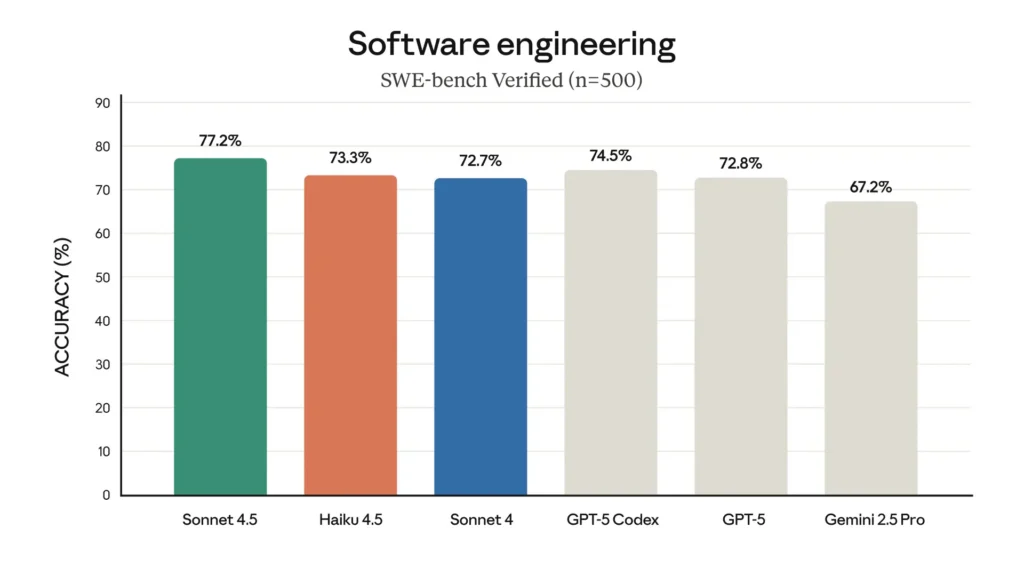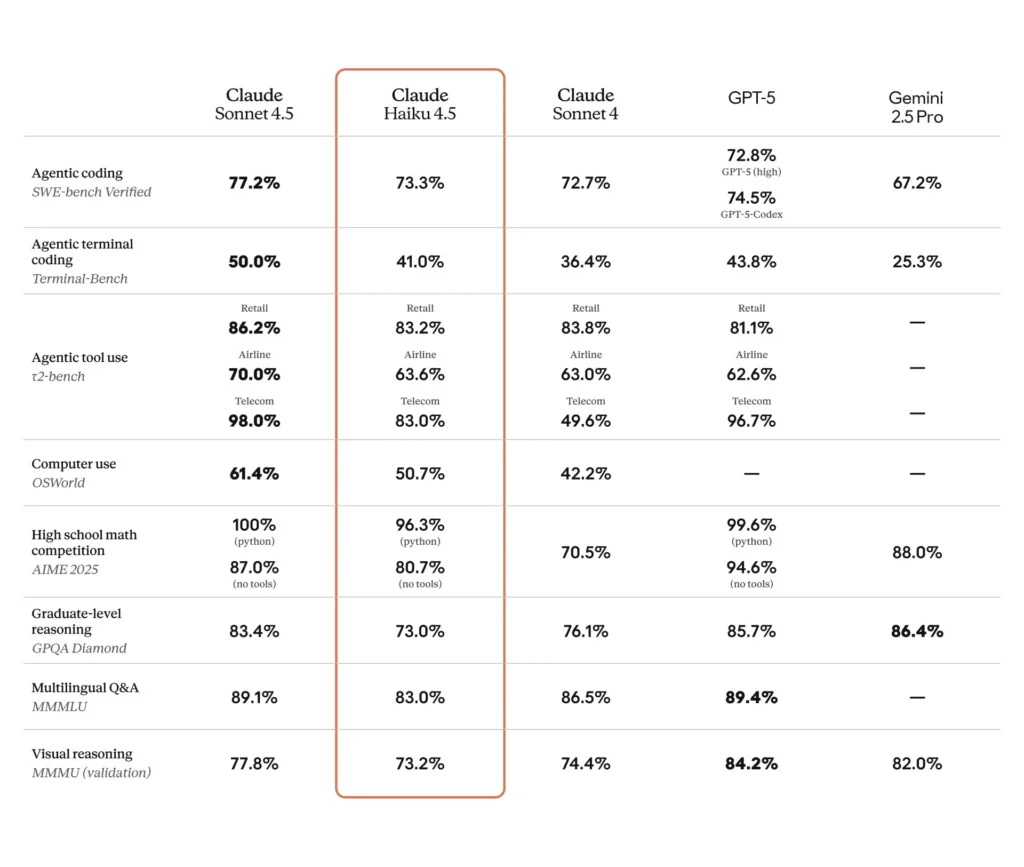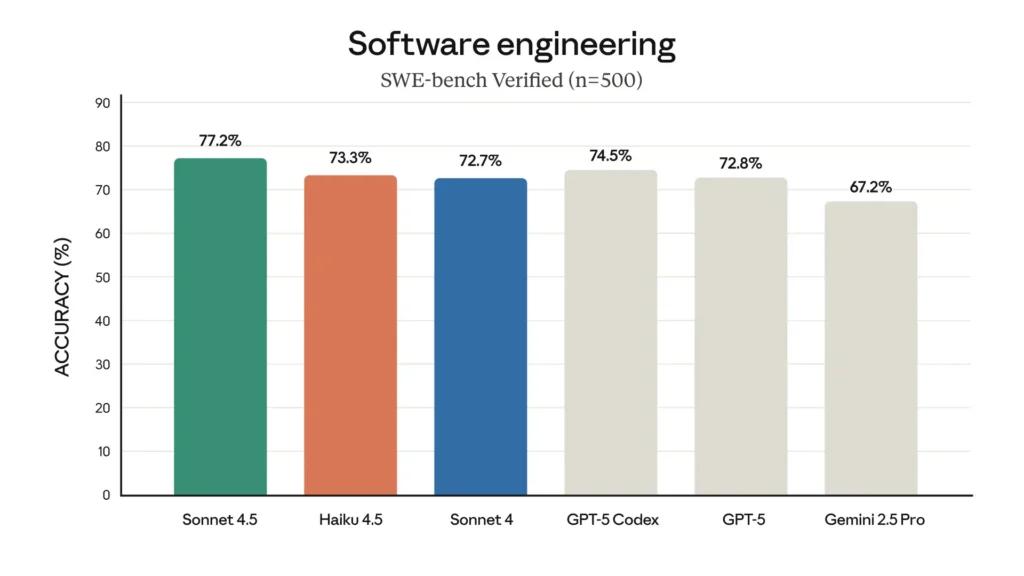Claude Haiku 4.5 is a purpose-optimized, smaller-class language model from Anthropic, released in mid-October 2025. It’s positioned as a fast, low-cost option in the Claude lineup that preserves strong capability on tasks like coding, agent orchestration, and interactive “computer-use” workflows while enabling much higher throughput and lower unit cost for enterprise deployments.
Key features
- Speed & cost-efficiency: Haiku 4.5 is described as more than twice as fast as Sonnet 4 and about one-third the cost of Sonnet 4 (and much cheaper than Opus), making it attractive for scaled usage.
- Extended thinking: First Haiku model to support extended thinking (summarized / interleaved thought, configurable thinking budgets) for deeper multi-step reasoning while balancing latency.
- Tools & computer use: Full support for Claude tools (bash, code execution, text editor, web search, and computer-use automation). Designed for agentic workflows and sub-agent architectures.
- Large context window: 200k token context window (with 1M context options available on larger models as beta for other model classes).
Technical details
- Training data & cutoff: Haiku 4.5 was trained on a proprietary mix of public and licensed data with a training cutoff around February 2025.
- Extended-thinking (a hybrid reasoning mode) is supported so the model can trade latency for deeper reasoning when requested.
- Context window at release is 200,000 tokens, and the model is explicitly context-aware (it tracks how much of the window has been used).
- Performance / throughput: Early community reports and Anthropic testing cite very high OTPS (output tokens/sec) and anecdotal speeds around ~200+ tokens/sec in some internal/early tests —far faster than many comparable mid-tier models.
Benchmark performance
SWE-Bench (coding): Haiku 4.5 scored ~73.3% on SWE-Bench Verified — a result Anthropic highlights as placing Haiku 4.5 among the world’s best coding models for its class.

Terminal / command-line / tool tests: Anthropic reported ~41% on Terminal-Bench (command-line focused) and comparable results to Sonnet 4 and several competing mid-range frontier models on many tool-use benchmarks.
Instruction-following & slide text: internal Anthropic examples claim Haiku 4.5 outperformed previous models on some instruction-following tasks (e.g., slide text generation: 65% vs 44% for a prior premium model in their benchmark).
Real-world automation / agent tasks: third-party evaluations and early adopters report competitive success rates on automated UI/agent tasks (for example, OSWorld-style or agent benchmarks reporting ≈50% success on complex automation in some tests), showing usefulness for scaled workflows though with nontrivial failure modes.

Limitations & safety notes
- Not a frontier model: Anthropic explicitly classifies Haiku 4.5 as not frontier-advancing; it is optimized for efficiency rather than pushing the absolute state of the art. ()
- Occasional sensitive-topic behavior: in some scientific / bio-safety related prompts Haiku 4.5 sometimes returns high-level information with caveats rather than strict refusals; Anthropic flags that as an area under ongoing improvement.
- Extended-thinking can change behavior (it sometimes increases asymmetry in responses).
Recommended use cases
- Agentic coding & multi-agent orchestration: fast sub-agents, iterative code refactor, autotests and patch generation. (Good fit.)
- Real-time, high-volume customer workflows: chat assistants, internal automation where cost-per-request matters. (Good fit.)
- Tool-enabled workflows & computer control: automating GUI/CLI tasks, document workflows and tool chains where low latency helps. (Good fit.)
- Not recommended (without controls): standalone roles that require frontier-level scientific sequence design or high-assurance biosecurity tasks. (Exercise caution.)
How to call Haiku 4.5 API from CometAPI
Haiku 4.5 API Pricing in CometAPI,20% off the official price:
| Input Tokens | $0.80 |
| Output Tokens | $4.00 |
cursor version: cometapi-haiku-4-5-20251001
API version: claude-haiku-4-5-20251001
Required Steps
- Log in to cometapi.com. If you are not our user yet, please register first
- Get the access credential API key of the interface. Click “Add Token” at the API token in the personal center, get the token key: sk-xxxxx and submit.
- Get the url of this site: https://api.cometapi.com/
Use Method
- Select the “
claude-haiku-4-5-20251001” endpoint to send the API request and set the request body. The request method and request body are obtained from our website API doc. Our website also provides Apifox test for your convenience. - Replace <YOUR_API_KEY> with your actual CometAPI key from your account.
- Insert your question or request into the content field—this is what the model will respond to.
- . Process the API response to get the generated answer.
CometAPI provides a fully compatible REST API—for seamless migration. Key details:
- Base URL: https://api.cometapi.com/v1/chat/completions
- Model Names:
claude-haiku-4-5-20251001 - Authentication:
Bearer YOUR_CometAPI_API_KEYheader - Content-Type:
application/json.
See also Claude Sonnet 4.5
